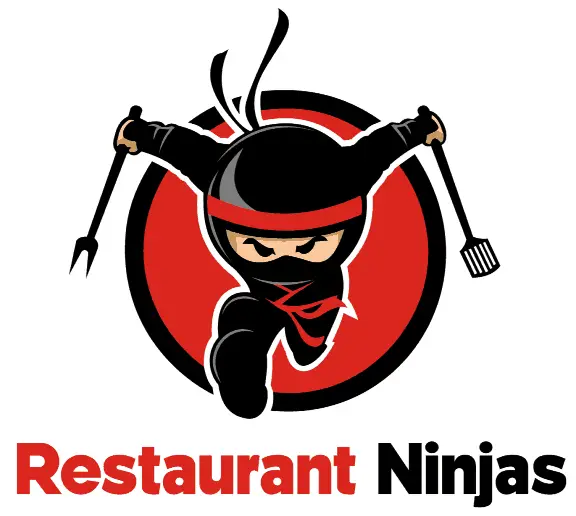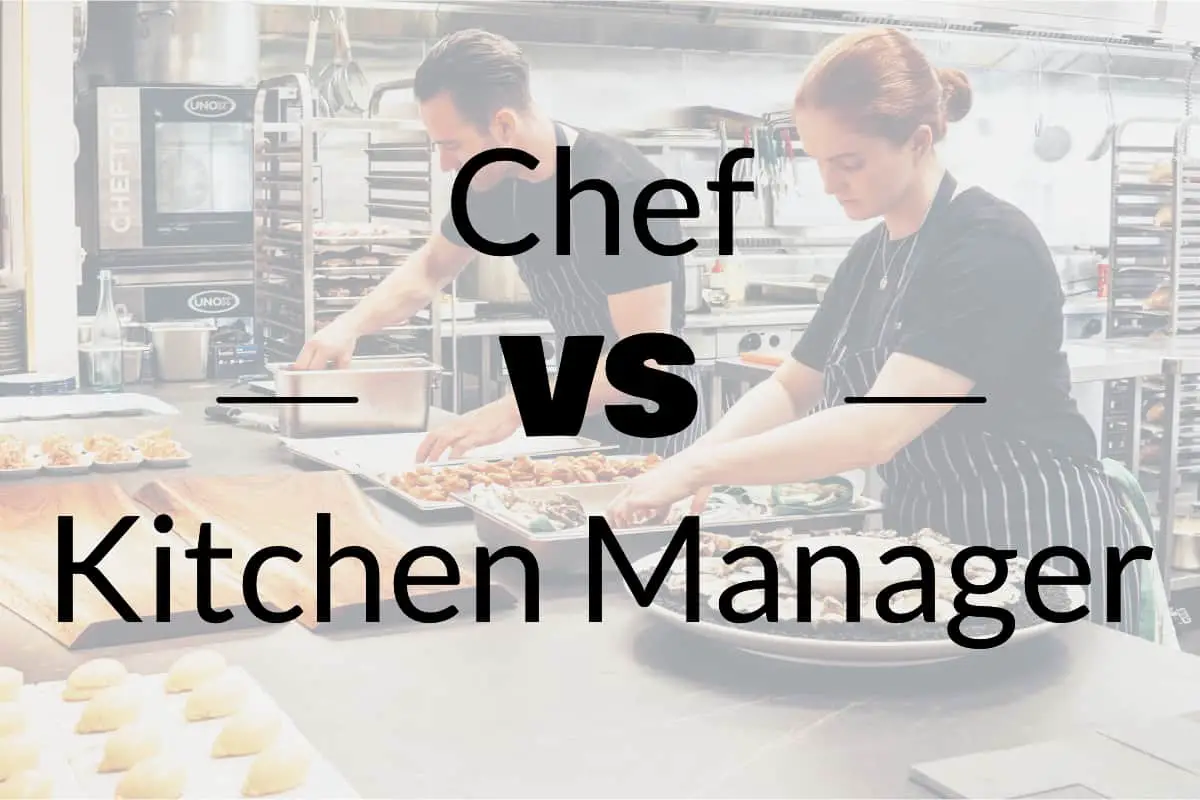When I was twelve I got my first paid job. It was at a diner and my dad was the Kitchen Manager. On my first day, my dad took me around to meet everyone and explain what they did. I was very confused when I met the Chef because I thought my dad was “the boss”.
While in this instance my dad was in charge of the kitchen, that is not always the case and the two titles generally mean different things and more often than do not exist together. I’m sure this leads to people asking what the difference is between the two.
What is the difference between a Chef and a Kitchen Manager? A chef is more food-focused, with designing and implementing the menu being the largest responsibility. A kitchen manager generally has no control of the menu and is instead in charge of operations using the system and tools that are already in place.
While this is the general answer, the truth is that it is done differently based on how the owner decides to set up the roles. It usually depends on the size and type of restaurant. Traditionally, there is a hierarchy of Chef positions in an operation, but this is hardly a rule.
In the diner I referenced above, the Chef was in charge of menu management, purchasing, and managing the prep team. The chef never worked on the line or talked much to the line cooks. My dad, the Kitchen Manager, was in charge of managing production and daily operations.
If the chef was concerned about the way an item was being prepared, he would have the Kitchen Manager address the issue with the cook in question.
What is the Role of a Kitchen Manager?

A Kitchen Manager’s role is focused on managing all facets of kitchen operations. This includes both coordinating daily operations and administrative work. A Kitchen Manager (often abbreviated as just “KM”) is usually found in establishments that serve simple food and is focused on running a single kitchen. You will find Kitchen Managers used more often in chain restaurants that have a fixed menu and defined systems and tools.
You will rarely find a Kitchen Manager in a high end or fine dining restaurant because a chef would be needed in that case to design and manage the menu. The Kitchen Manager’s goal is to replicate a system that has been proven successful rather than reinvent the wheel.\
Kitchen Managers are more focused on the business end of the restaurant than they are in menu management. That said, Kitchen Manager often has the flexibility to run daily specials of their choosing based on the needs of both inventory and seasonality. The ability to run specials is important as a tool in the Kitchen Managers’ arsenal to control food costs.
Administratively, Kitchen Managers duties will vary depending on the restaurant. Some Kitchen Managers are in charge of staffing, which means taking the time to hire and fire staff as needed.
With cost controls being such a big part of the job, Kitchen Managers are usually in charge of managing the ordering and inventory process to control food costs as well as the back of house scheduling to control labor costs. They also might be in charge of managing repairs to equipment and performing preventative maintenance to control R&M costs.
There are other items that Kitchen Managers might find themselves in charge of depending on the restaurant. These duties include ordering supplies, basic accounting, training and development of staff, food safety, system management, and kitchen cleanliness.
Larger restaurants might warrant the need for the Kitchen Manager to have one or more Assistant Kitchen Managers (which is often shorted to “AKM”). The Assistant Kitchen Manager role is often used as a stepping stone into management for employees who have no previous management experienced. An Assistant Kitchen Manager would be similar to a Sous Chef in the traditional Chef hierarchy.
There is no specific schooling that needs to be completed to become a Kitchen Manager. Most Kitchen Managers have not been to culinary school but instead, have gone to school for hospitality management or general business administration.
It is not unusual for a Kitchen Manager to have no formal education. It was not an issue for me obtaining Kitchen Manager jobs early in my career as I myself have no formal schooling and was instead promoted based on my performance. Often, Kitchen Managers are individuals who started as cooks and were promoted from within. Salary.com did a recent study on Kitchen Manager Salary:
The average Kitchen Manager salary in the United States is $51,245 as of June 27, 2019, but the range typically falls between $42,834 and $61,190
Salary.com
What are the Roles of a Chef?

The role of Chef can mean so many different things and there are many different types of Chefs. Before going into how a Chef is different from a Kitchen Manager it is important to get some background on the different types of chefs.

Executive Chef: The Executive Chef is at the top of the Chef food chain. Also known as Group Chefs, Executive Chefs usually oversee multiple locations and very rarely do any cooking outside of experimental cooking. They are instead in charge of menu development throughout the chain of restaurants and sourcing the ingredients for the menu. This is a management role for a Chef who is well seasoned in both food science and leadership.
Head Chef: The Head Chef, known as a “Chef de Cuisine” in French kitchens, is the head of an individual kitchen. They act as the manager of the kitchen and complete most of the duties that a Kitchen Manager does in addition to menu design and management. Head Chefs usually have other Chefs beneath them to run the daily operations (unless the Kitchen is small enough for the Head Chef to not need the support).
Sous Chef: The Sous Chef is like the first mate on a ship. He or she is the second in charge to the Head Chef. In fact, the literal translation of Sous Chef is “under chef”. There is a lot of overlap in responsibilities between the Sous Chef and Head Chef but generally, the Sous Chef is more hands-on in operations. When the Head Chef is not in the building, the Sous Chef is in charge. Smaller kitchens might not have a Sous Chef. There are some variations to the title of Sous Chef that I have seen used sparingly, most frequently “Jr.” or “Sr.” Chef.
Chef de Partie: Out of all the Chef titles, Chef de Partie is used the least. It is interchangeable with Line Chef or Station Chef. It really is just a fancy term for “line cook”.
There are a bunch of other variations out there. Basically, you can take any kitchen niche and add “Chef” to it to find another title. The most common of these include Pastry Chef, Butcher Chef, Fry Chef, and Grill Chef.
With all the different types of “Chef” defined above it becomes more difficult to define the difference between a Chef and a Kitchen Manager. Generally, a Head Chef is most similar to a Kitchen Manager, so these are the two roles most commonly compared.
A Chef is like a Kitchen Manager on steroids. They have all the same responsibilities as a Kitchen Manager with the added job of menu management.
Menu management is very time-consuming. Designing specials and new menu items as well as ensuring the integrity of the current menu is the biggest part of menu management after the initial menu is created. Many Chefs create a brand new menu when they take over a kitchen. When creating an initial menu (or a new menu) factoring in costs to ensure profitability becomes a huge part of the process and can be very time-consuming.
Adding menu management to the Kitchen Managers’ responsibilities make it sound like the Chef has a lot more on their plate, but often a Chef will have others involved in some of the administrative functions, like hiring and scheduling, in order to make all the time balance out.
The best way to become a Chef is to go to a reputable Culinary School for training. There are many Chefs who manage to earn the job without formal schooling, but in order to have the depth of knowledge in food science to excel as a Chef Culinary school is the best choice. Another option is an apprenticeship, which is how my father trained to be a Chef.
Figuring out an average salary for a Chef is not as straight forward, because of the Chef Hierarchy. Due to the wide variety of responsibilities that each chef role might entail, there is a larger range of salaries than that of a Kitchen Manager. Looking again at salary.com, the most recent salary ranges are as follows:
- Executive Chef: Between $58,278 and $82,701 with a median of $68,392
- Head Chef: Between $58,300 and $82,800 with a median of $68,400
- Sous Chef: Between $37,366 and $57,432 with a median of $45,991
- Chef De Partie: Between $21,034 and $30,00d with a median of $24,573
Depending on how you want to run your restaurant or what is already in place, consider the titles you want to be given to appropriately define their role. This also gives you the reader an idea of what salary ranges are out there should you decide to pursue one of these careers in the restaurant world!

